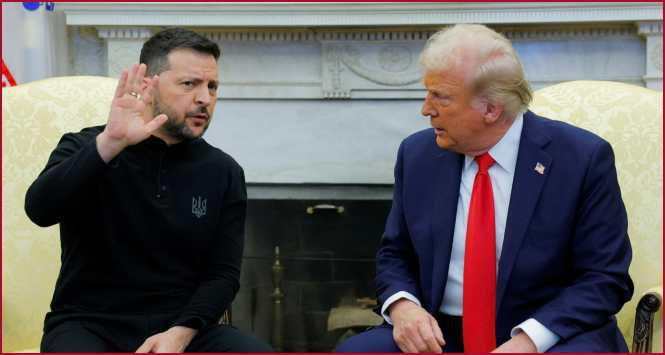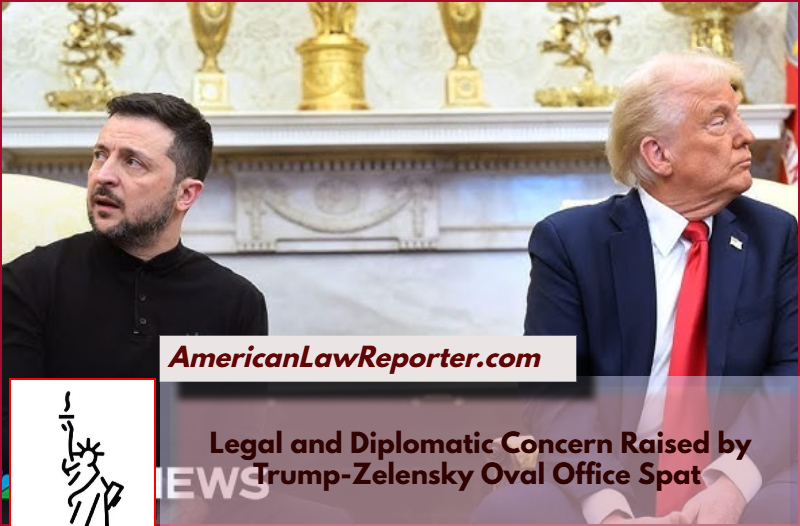The recent diplomatic clash between U.S. President Donald Trump and Ukrainian President Volodymyr Zelensky during Zelensky’s visit to the Oval Office has sparked intense debate about the United States’ global image and the potential legal ramifications.
The contentious exchange, which revolved around U.S. military aid to Ukraine and the possibility of peace negotiations with Russia, has implications that extend far beyond the diplomatic fallout.
Diplomatic Tensions and U.S. Global Image

The confrontation between Trump and Zelensky has raised concerns about the United States’ reliability as an ally.
Historically, the U.S. has positioned itself as a steadfast supporter of Ukraine in its fight against Russian aggression. However, Trump’s decision to pause $1.61 billion in military aid following the heated meeting has sent mixed signals to allies and adversaries alike.
Undermining U.S. Commitments
The suspension of military assistance to Ukraine has fueled skepticism among NATO allies, who are already apprehensive about Trump’s approach to transatlantic relations.
European nations, particularly those bordering Russia, are increasingly wary of the potential for U.S. disengagement from the region. If America appears unreliable in its commitments to Ukraine, other allied nations may question whether similar actions could be taken against them in times of crisis.
A Win for Russia?
From an international perspective, Russia stands to gain the most from this episode. By suspending aid and pushing Ukraine toward a negotiated peace that may involve concessions, Trump’s actions align—whether intentionally or not—with Russian strategic interests.
Moscow has already praised Trump’s position, seeing it as an opportunity to weaken Ukrainian resistance without resorting to further military escalation.
Damage to U.S. Moral Authority
The incident also damages the U.S.’s moral authority on global human rights and democratic principles.
Washington has long championed the protection of smaller nations against aggressive expansionism. However, pressuring Ukraine to make concessions could be perceived as the U.S. abandoning its advocacy for self-determination, thus eroding its credibility in promoting democratic values worldwide.
Legal Implications
Beyond its geopolitical impact, the Oval Office spat has raised significant legal questions at both the domestic and international levels.
Domestic Legal Concerns
Executive Authority Over Foreign Aid
Under U.S. law, Congress has significant authority over the allocation of foreign aid. While the President can delay or withhold funds under certain circumstances, Trump’s decision to unilaterally suspend military aid raises constitutional questions.
Critics argue that his move echoes the 2019 impeachment inquiry, where he was accused of leveraging military assistance to pressure Ukraine for political gain.
If Congress determines that Trump’s actions violate the Impoundment Control Act of 1974, legal challenges could ensue.
Potential Violations of Congressional Intent
If the suspension of aid contradicts congressional appropriations, lawmakers may challenge the decision through legislative or judicial means. Congressional committees may launch inquiries into whether the Trump administration’s decision was legally justified or if it amounts to an abuse of executive power.
International Legal Implications
Breach of Bilateral Agreements
The U.S. has various security and military agreements with Ukraine, including commitments under the 1994 Budapest Memorandum, in which the U.S., U.K., and Russia pledged to respect Ukraine’s sovereignty in exchange for Kyiv relinquishing its nuclear arsenal.
By pausing military assistance, Trump may be undermining these commitments, potentially violating international agreements and further diminishing trust in U.S. treaty obligations.
Encouraging Coerced Diplomacy
Forcing Ukraine into peace negotiations by withholding military aid could set a dangerous precedent under international law.
If nations perceive that powerful countries can pressure smaller allies into unfavorable diplomatic settlements, this could embolden other global actors to engage in coercive diplomacy, thereby destabilizing international legal norms.
The Role of the International Criminal Court (ICC)
While the U.S. is not a member of the ICC, the court has jurisdiction over crimes involving aggression, war crimes, and human rights violations. If Ukraine is forced into an unjust peace that enables Russian territorial expansion, legal scholars may argue that Trump’s actions contributed to undermining Ukraine’s sovereignty.
Although unlikely to lead to direct legal consequences for Trump, such arguments could influence future policy decisions and international legal interpretations.
Looking Ahead
As diplomatic and legal fallout from the Oval Office confrontation continues to unfold, the Trump administration faces mounting scrutiny.
Whether Congress challenges the aid suspension or European allies push back against U.S. policy shifts, the ramifications of this dispute will be felt for months, if not years, to come.
In an election year, Trump’s handling of Ukraine could also have domestic political consequences, with critics questioning his commitment to U.S. alliances and strategic interests.
Ultimately, this episode reflects the delicate balance between diplomacy, legal obligations, and geopolitical strategy.
How the U.S. navigates this crisis will shape not only its relationship with Ukraine but also its standing as a global leader in international law and security.

